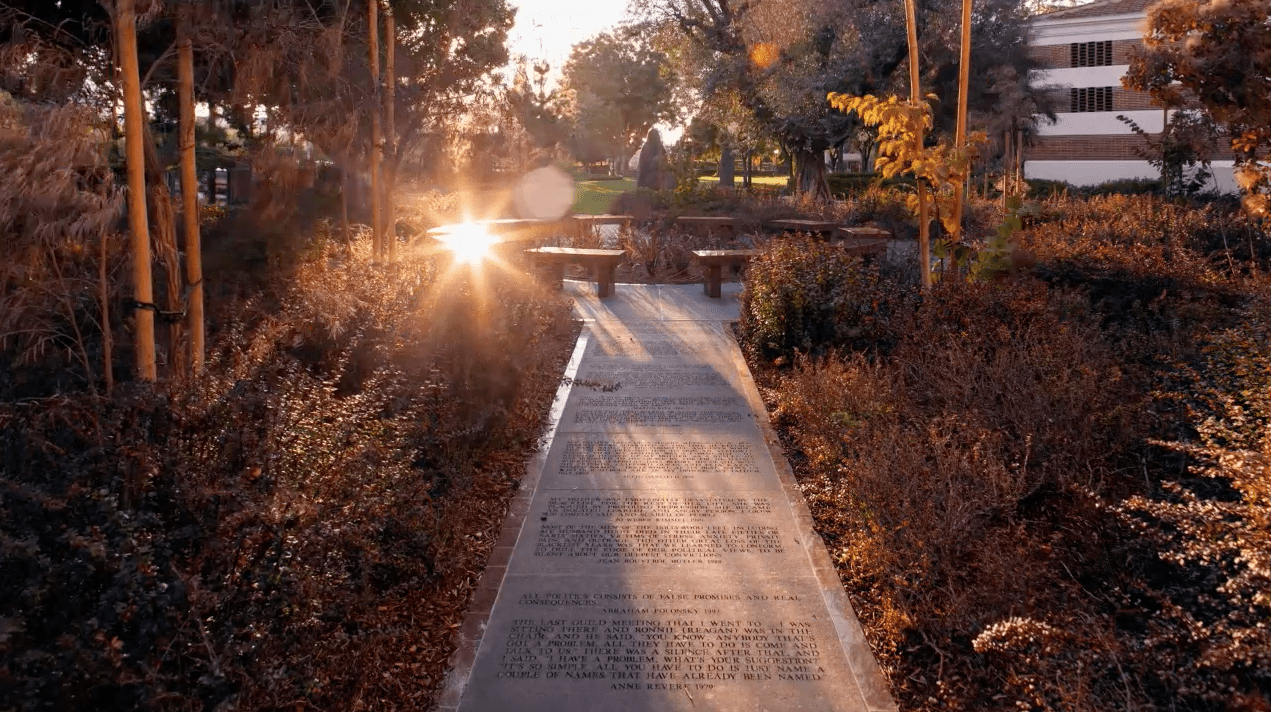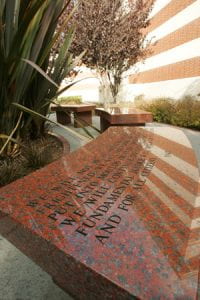“This garden would have you think how hate and fear can poison daily life. It is a monument to the First Amendment and a memorial to the creative artists and others who became victims of the cold war. Blacklisting ended careers and ruined lives. It silenced public debate, undermined due process and freedom of thought, and weakened the elaborate protections of the minority that safeguard American liberty.” — Jenny Holzer, 1999
In October of 1947, the House Un-American Activities Committee subpoenaed ten filmmakers to testify about their alleged subversive political beliefs. After these “Hollywood Ten” refused to testify, exercising their First Amendment Privileges, they were cited for contempt of Congress, for which they were ultimately imprisoned and blacklisted – prevented from gainful employment – by the Hollywood studios and broadcast networks. By 1951, as a result of ongoing Congressional hearings, hundreds more were blacklisted, harassed, or driven from their jobs, and in some cases from their homes.
The First Amendment/Blacklist Project Committee was formed by faculty members of the Filmic Writing Program in the School of Cinema-Television at the University of Southern California in Los Angeles at the suggestion of an undergraduate student in response to a recognition that many future film-makers knew little or nothing of this governmental infringement on professional creativity and personal civil liberties. The committee convened to commission a work of art in a public setting to remember the blacklisting and intimidation of creative artists, teachers, and countless other citizens during the McCarthy Era of the 1940s and 1950s. A roster of artists working in the field of public art was invited to submit proposals. The committee’s final choice was unanimous.

Jenny Holzer’s work is represented in museums, public spaces, and private collections throughout the world. Holzer addresses herself to the public forum and envisions her audience as the public at large. Part poet and part sculptor, Holzer has combined text and form to create a sculptural environment in a garden setting that resonates with unsettling meaning. Her research into the period generated hundreds of quotes from which she chose the dozens that have been inscribed in stone to remind us of that past and to inspire vigilance and personal responsibility in exercising, upholding and defending the civil liberties granted to individuals under the Constitution of the United States and the Bill of Rights.
The planting design was created by Professor Achva Benzinberg Stein, FASLA.
Blacklist, 1999. A Public Work by Jenny Holzer. Collection of Fisher Museum of Art, University of Southern California. This work is a gift of The First Amendment/Blacklist Project Committee.
A video introduction to Blacklist
Blacklist Coverage
Jenny Holzer Sculpture to Convey Essence of First Amendment in Stone (1999)
Treasures are Drawn to Academic Sanctuaries (2006)
Fisher Garden Sheds Light on Censorship (2012)
Trojan Tales: Blacklist Benches Commemorate Red Scare (2016)
Useful Links
The First Amendment Encyclopedia
Blacklists by Brandon R. Burnette
Acquire a fundamental definition of “blacklist” within the context of the 40s and 50s in Hollywood film making. This in accordance with an overview of the socio-political divisions between the House Committee on Un-American Activities (HUAC) and those investigated, as well as an insight into the various injustices that surrounded the HUAC hearings.
A breakdown of the Hollywood 10, “a group of film directors, screenwriters, and producers blacklisted for Communist affiliations in 1947” by historian Yohuru Williams.
“It was the age of loyalty oaths and McCarthyism, a chilling time in which free speech and the 1st Amendment were tossed out the window. Lives and careers were also ruined in other fields, but it was Hollywood, the incubator for America’s popular culture, that became center ring for the Red Scare circus.” -Patrick Goldstein for the L.A. Times
You Must Remember This by Karina Longworth / Panoply
“Blacklist 16-Part Series”: Episode 71 – Episode 86
“You Must Remember This”, a podcast dedicated to exploring the history of 20th century Hollywood, delves into communism versus anti-communism in Hollywood – particularly the characters, political evolution, and cultural changes that resulted from the Blacklist.
Arthur Miller, Elia Kazan and the Blacklist: None without Sin (Sep 2003)
American Masters Film: Directed by Michael Epstein
A part of the American Masters PBS series, this documentary recounts the political, personal and artistic relationship between playwright Arthur Miller and director Elia Kazan in the era of McCarthyism. Specifically, the moral dilemma of Kazan’s controversial testimony to the HUAC in which he named names of those he knew as Communists, and the results of these actions on their friendship, careers, and artistic production.
Was Communism a Threat to Hollywood?
Panel Discussion: 2005 Liberty Film Festival
Join the debate of the impact of communism on the film industry with a panel of authors and journalists at the 2005 Liberty Film Festival, moderated by film historian John Meroney. The further intent of this panel discussion is to discuss the theme of free speech and diversity in the arts under the evaluation of the blacklist.
The Hollywood Blacklist. Panel at the 2005 Liberty Film Festival
May 12, 1997
Join Melinda Penkava for a discussion about blacklisting, censorship and new efforts to credit the work of the artists who lost their careers
With guests: Film critic and Colorado Public Radio Lecturer, Howie Shovivitz; co-author of The Inquisition in Hollywood, Larry Ceplair
“Trumbo”: A Blacklisted Writer, In His Own Words
June 17, 2008
Trumbo is a unique film about screenwriter Dalton Trumbo and his heroic journey from Hollywood royalty to blacklisted writer to Academy Award winner. Based on a play by his son Christopher, Trumbo documents the rise of Dalton s career in Hollywood and his subsequent public humiliation from being among the Hollywood Ten blacklisted by the House Un-American Activities Committee in the 1940s for communist associations. Exiled and penniless, Dalton wrote under various pseudonyms, even winning two Academy Awards. Viewed by many as a moral and just man, Dalton Trumbo stood for the American value and right of free expression.
View Trailer
Film Available on Amazon
